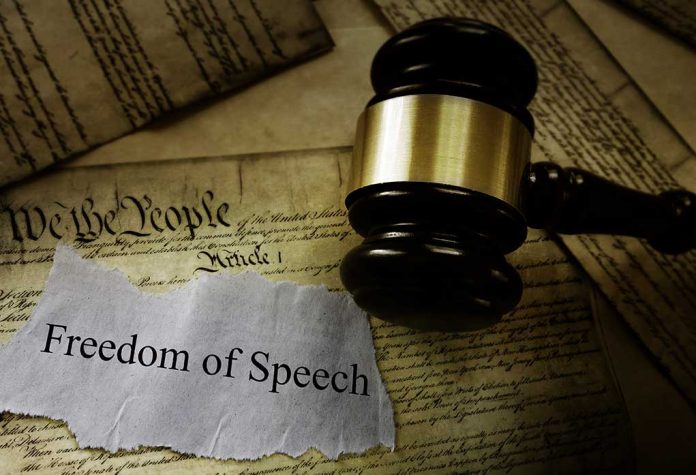
A Texas journalist’s fight for press freedom reaches the Supreme Court, highlighting the precarious state of First Amendment rights in America.
At a Glance
- Priscilla Villarreal, known as “Lagordiloca,” was arrested for her journalism in Laredo, Texas.
- The arrest was based on an obscure Texas law criminalizing the solicitation of nonpublic information.
- The case has sparked a major First Amendment battle, with the Supreme Court potentially reviewing it.
- Over 40 civil liberties groups and media organizations have submitted briefs supporting Villarreal.
- The outcome could have far-reaching implications for press freedom and government accountability.
A Citizen Journalist’s Legal Battle
In the heart of Laredo, Texas, a fierce battle for press freedom is unfolding. Priscilla Villarreal, known to her 217,000 Facebook followers as “Lagordiloca,” finds herself at the center of a constitutional storm that could reshape the landscape of American journalism. Villarreal’s independent reporting style, which involves livestreaming on social media, has put her on a collision course with local law enforcement and thrust her case into the national spotlight.
In 2017, Villarreal was arrested after reporting on two stories, using information she had obtained from a police officer. The arrest was based on an obscure Texas law that criminalizes soliciting nonpublic information for personal benefit. This incident has since snowballed into a major First Amendment case that may soon be heard by the Supreme Court.
A Texas reporter who was arrested for asking questions asks SCOTUS to reject the criminalization of journalism. https://t.co/ytgR0NwQdc
— reason (@reason) April 26, 2024
The Legal Landscape
The U.S. Court of Appeals for the 5th Circuit ruled 9-7 against Villarreal, with judges deeply divided on whether her arrest violated the First Amendment. This decision has alarmed press freedom advocates and constitutional scholars alike. The Reporters Committee for Freedom of the Press, along with 21 other media organizations, have filed an amicus brief urging the Supreme Court to hear Villarreal’s case.
“If they can throw me in jail for asking a question, none of our free speech rights are safe,” said Priscilla Villarreal. “Our First Amendment rights don’t depend on our popularity with local politicians. My case is not just about me, but also the rights of every American.”
The case has drawn attention to the broader issue of how citizen journalists operate in today’s media landscape. Villarreal, who considers herself free from traditional media constraints, has been described as “arguably the most influential journalist in Laredo.” Her unorthodox approach has both endeared her to followers and made her a target for those who prefer more traditional reporting methods.
Implications for Press Freedom
The implications of Villarreal’s case extend far beyond Laredo. It raises crucial questions about the extent to which journalists can seek information from government officials without fear of reprisal. The decision by the 5th Circuit Court has been criticized by dissenting judges who argue that it undermines the First Amendment and the right to gather and report news.
“They figured that this would shut me down,” says Priscilla Villarreal. “But what they did was create a monster.”
The Foundation for Individual Rights and Expression (FIRE) is among the organizations asking the Supreme Court to hear the case. They argue that it’s essential to ensure government officials are held accountable for violating First Amendment rights. The broad support for Villarreal’s case, including 13 amicus briefs from over 40 individuals and organizations, underscores the significance of this legal battle for press freedom in America.
A Test for American Democracy
As Villarreal’s case potentially moves to the Supreme Court, it serves as a critical test for American democracy and the protections afforded to journalists under the First Amendment. The outcome could have far-reaching consequences for how reporters interact with government officials and the level of transparency citizens can expect from their local authorities.
For conservatives who value limited government and individual liberties, this case presents a complex challenge. While some may critique Villarreal’s unconventional methods, her fight against government overreach in silencing journalism resonates with core conservative principles of free speech and checks on government power.
As the nation watches, the resolution of Villarreal’s case may well determine the future of investigative journalism and the ability of citizens to hold their government accountable. It’s a reminder that the freedoms we often take for granted require constant vigilance and, sometimes, fierce legal battles to preserve.
Sources:
- This Texas Woman Was Jailed for Her Journalism. Is She the Future of Media?
- Journalist jailed for asking police a question seeks Supreme Court review
- Broad ‘friend of the court’ support pours into Supreme Court for citizen journalist Priscilla Villarreal
- This Court Case Could Make It a Crime To Be a Journalist in Texas
- A local reporter was arrested for doing her job. The Supreme Court needs to step in.










